Invest 30 seconds...
...for what may lead to a life altering association!
Help Line
- +91.8800.2828.00 (IND)
- 1030-1830 Hrs IST, Mon-Sat
- support@expertsglobal.com
A GMAT test score is a scaled score of the individual scores obtained in the Verbal and Quantitative sections of the GMAT exam. While the GMAT consists of 4 different sections, namely, Integrated Reasoning, Analytical Writing Assessment, Verbal Reasoning, and Quantitative Reasoning, the scores obtained in the sections on Verbal and Quantitative Reasoning only compute the total score obtained on the GMAT; the Integrated Reasoning(IR) and Analytical Writing Assessment (AWA) scores do not add to the total GMAT score.
The following table depicts the score range for each GMAT section and the section-wise average GMAT scores for test takers, from Jan 2015 to Dec 2018.
| GMAT Sections | Score Range | No. of Questions | Types of Questions | Mean Scores |
|---|---|---|---|---|
| Analytical Writing Assessment | 0 to 6 | 1 | Analysis of an Argument | 4.49 |
| Integrated Reasoning | 1 to 8 | 12 | Graphic Interpretation, Table Analysis, Multi-source Reasoning, Two-part Analysis | 4.41 |
| Verbal Reasoning | 6 to 51 | 36 | Reading Comprehension, Critical Reasoning, Sentence Correction | 27.08 |
| Quantitative Reasoning | 6 to 51 | 31 | Data Sufficiency, Problem Solving | 40.02 |
| Total Average GMAT Score | 563.43 | |||
Source: mba.com, sample size: 739752, TY 2015 – TY 2018
A standardized assessment test, the GMAT has been efficiently divided into individual sections that assess the applicant’s particular skill-sets, skills that are actually relevant in the post-grad industry. Thus, GMAT tests a candidate’s ability to critically evaluate a given piece of information and adequately communicate ideas, study data presented in various formats, solve problems, read and comprehend written information, and abide by the standard norms of the English language.
A common question may refer to the striking similarities in the format of and requirement of both the GMAT and the GRE scores as an important criterion for furthering applications to grad school programs. Before being perturbed by the question of whether to take GMAT or GRE, the student must know the fundamental differences between the two:
Thus, it may be safe to say that GMAT test scores for MBA are more widely preferred and accepted by the B-schools while conducting their admission process. The average total score and the average individual section scores on GMAT are not the qualifier of the minimum score requirement. Rather, the average scores suggest that ~67% of the population of the GMAT test takers has scored in the given range. For instance, an average score of 4.48 in the Analytical Writing Assessment section, recorded in test taking year 2015-17, implies that 34% of the population scored in the range of 4 – 6 in GMAT. An MBA aspirant should always target standing between the 90th and the 99th percentile in GMAT.
To garner a better understanding of the individual sections and to assess your competency in each, take a free GMAT mock test.
In GMAT, a candidate is scored on a total score range of 200 – 800 and the Quantitative Reasoning and Verbal Reasoning scores contribute to the total GMAT score. Each of the sections are, however, individually graded as follows:
On completion of the test, the student immediately receives the total scaled Quant score, the total scaled Verbal score, the total scaled Quant and Verbal score, and the IR score. This is, however, not the final GMAT score report; it is only after the receipt of the AWA score that is provided within 3 weeks from the date of the exam that the final GMAT Score Report is generated. The final GMAT score report does not include only the total GMAT score; rather, the final GMAT score report declares the following 5 parts:
Percentile rank indicates the proportion of candidates who scored lower than you on GMAT. Percentile rank, thus, allows the Admissions Committee to perform a comparative analysis of the quantitative and verbal skill-set of the incoming batch. Thus, if you score a 770 on GMAT and earn the 99th percentile rank, it means that 99% of the students who took the test with you got a score below 770 and only 1% of the test taking population performed as you or better than you. Percentile ranks are a crucial means of determining your stand in the batch of your shortlisted program and to gauge your eligibility to obtain scholarships.
The percentile ranking on individual sections of GMAT also plays a crucial role in depicting the candidate’s specific skill-set and stand in the pool of applicants. The 38th percentile ranking in the Quantitative section indicates that 38% of the test takers earned a score below 39.93 on GMAT Quant. Similarly, the 47thpercentile ranking in the Verbal section indicates that 47% of the test takers scored below 27.04 on GMAT Verbal. It is not necessary that the percentile ranking will be the same for the corresponding scores in GMAT Quant and Verbal. Thus, while a score of 46 will place you in the 58thpercentile in GMAT Quant, the same score will place you in the 99th percentile in GMAT Verbal. The difference mainly arises from the fact that most of the GMAT test takers are non-native English speakers and hence have trouble getting higher scores in the Verbal section than they do in the Quantitative section. Scroll below to understand how the individual sections are scored on GMAT and how the percentile rank and scores relate to each other on the respective GMAT sections.
However, please note that although your GMAT score will remain constant over the years, your percentile rank is subject to change as the percentile rank is a determinant of your performance in a given group of test takers.
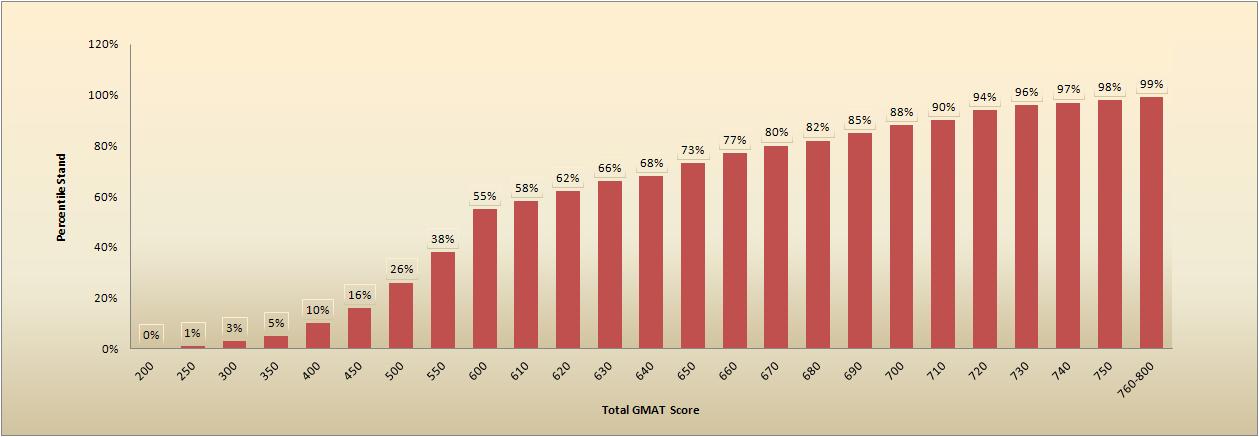
Source: mba.com, sample size: 739752, TY 2015 – 2018
The Graduate Management Admission Council, or GMAC, does not share the algorithm that it uses to ascertain the total GMAT test score. However, the GMAT score does depend upon a few important factors:
Further,
Each section on GMAT follows an independent scoring pattern and is graded on a separate score range. Although the cumulative scores obtained in the Verbal and Quant sections only determine the total GMAT exam score, the individual scores of the AWA and IR sections are also equally important to ratify the critical thinking and analytical skills of the candidates. There is no clear benchmark for the minimum number of questions that need to be correctly answered to achieve at least the mean section scores; the following table plots the individual approximate scaled scores on both the Verbal and Quant sections that cumulatively will contribute to the total GMAT score.
Please take a close look at the table:
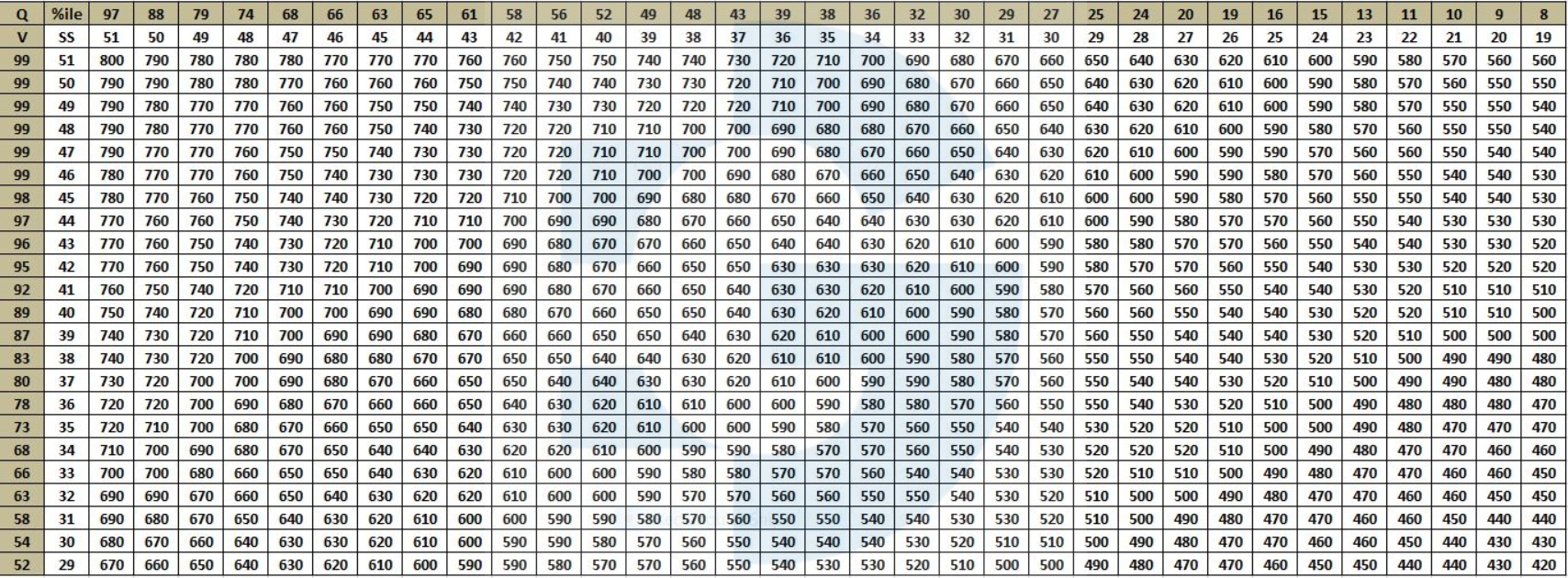
There is no definite way to suggest that a given number obtained in individual GMAT sections will contribute to the desired GMAT total score. For instance, consider the following examples:
There is no definite way to determine the perfect competitive score on GMAT; aim for the higher percentile and plan your test-taking strategy such that your cumulative GMAT test score remains on the higher side.
Let us examine the scoring pattern of each separate section:
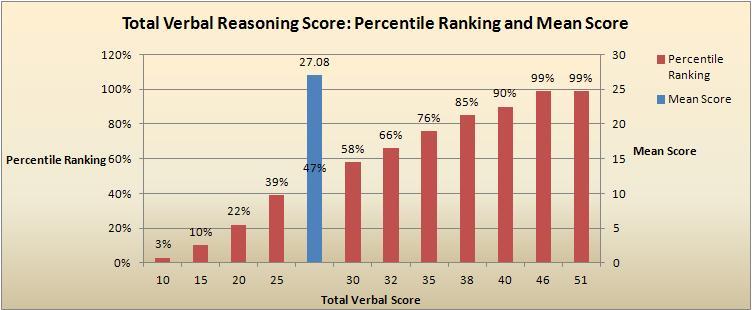
Source: mba.com, sample size: 739752, TY 2015 – 2018
Verbal Reasoning:
This section consists of 36 questions on reading comprehension, critical reasoning, and sentence correction. The score range for this section is between 6 and 51. Graded in 1 increment, this section is computer-adaptive. Thus, with each correct answer the difficulty level of the succeeding question increases. The trick to scoring high in this section is to answer the maximum number of high-difficulty level questions correctly. If you are unable to provide a correct answer to a question, the level of difficulty adjusts itself to that of the last correctly answered question. Hence, it is important that you attempt to answer all the questions. Do not ponder long on a particular question; manage your time effectively. The average score on this section is 27.08. In other words, almost 47% of the test takers have scored in the range of 20 – 30; if you get a score below 20, you will have to improve upon your performance.
To better understand the section, check these sample questions on Verbal Reasoning.
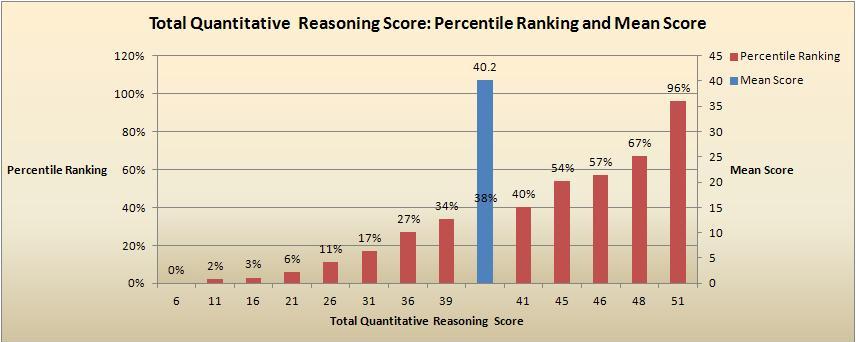
Source: mba.com, sample size: 739752, TY 2015 – 2018
Quantitative Reasoning:
This section consists of 31 questions on data sufficiency and problem solving. The score range for this section is between 6 and 51. Graded in 1 increment, this section is computer-adaptive. Thus, with each correct answer the difficulty level of the succeeding question increases. The trick to scoring high in this section is to answer the maximum number of high-difficulty level questions correctly. If you are unable to provide a correct answer to a question, the level of difficulty adjusts itself to that of the last correctly answered question. Hence, it is important that you attempt to answer all the questions. Do not ponder long on a particular question; manage your time effectively. The average score on this section is 40.2. In other words, almost 38% of the test takers have scored in the range of 30 – 42; if you get a score below 30, you will have to improve upon your performance.
To better understand the section, check these sample questions on Quantitative Reasoning.
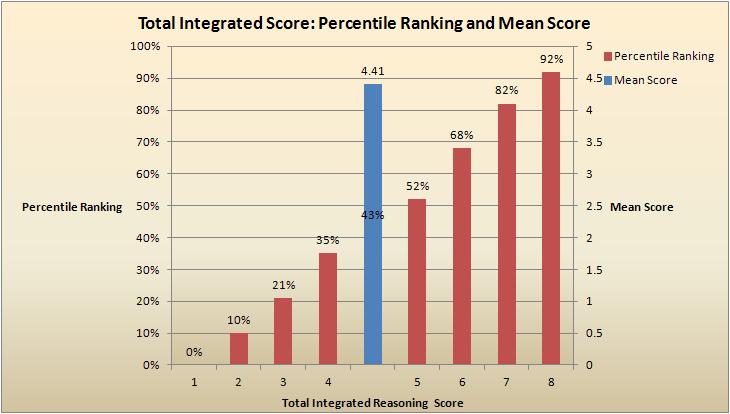
Source: mba.com, sample size: 739752, TY 2015 – 2018
Integrated Reasoning:
This section consists of 12 questions on graphics interpretation, table analysis, multi-source reasoning, and two-part analysis. The score range for this section is between 1 and 8. Graded in 1 increment, this section is not computer-adaptive. Thus, the level of difficulty of the questions does not depend on whether you provide the correct or the incorrect answer. Further, for a question to be considered correctly answered, all parts of the question must be correctly responded to. Hence, it is important that you attempt to answer all the questions. Do not ponder long on a particular question; manage your time effectively. The average score on this section is 4.41. In other words, almost 43% of the test takers have scored in the range of 4 – 5; if you get a score below 4, you will have to improve upon your performance.
Sample Questions: Multi-Source Reasoning, Table Analysis, Graphics Interpretation, Two-part Analysis
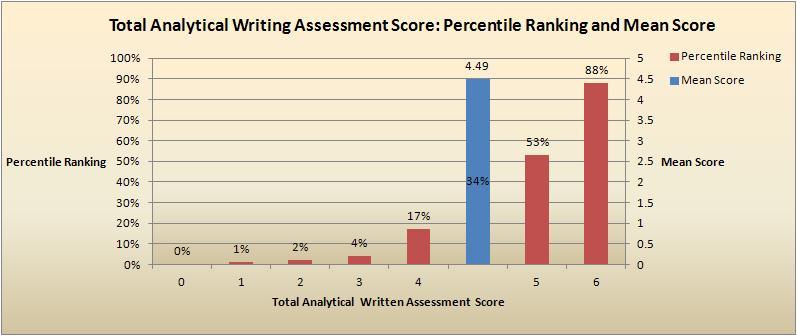
Source: mba.com, sample size: 500503, TY 2015 – 2018
Analytical Writing Assessment:
This section consists of only 1 question – analysis of a given argument. The score range for this section is between 0 and 6.Graded in 0.5 increments, the response is twice evaluated, once by a human reader and once by an e-rater, and the average of the two scores provides the final score of the section. The average score on Analytical Writing Assessment is 4.49.In other words, almost 34% of the test takers have scored in the range of 4 – 5; if you get a score below 4, you will have to improve upon your performance.
To better understand the section, check this sample question on Analytical Writing Assessment.

Source: GMAC Profile of GMAT Testing: Citizenship, TY 2014 – TY 2018; GMAC Profile of GMAT Testing: Citizenship, TY 2010 – TY 2014; GMAT Average Score, 2009: gmac.com: ‘2009 GMAT Profile Yields Data Both Grand and Grandular’
That the average GMAT test score for the year 2017-18 is 563.43 indicates that almost 2/3rds of the candidates who had taken GMAT in 2017-18 scored in the range of 400 – 600.The average GMAT score differs from school to school depending on the rank of the program, the duration of the program, and the employment opportunities provided by the program. Thus, an average GMAT score in the range of 600-650 may be a competitive score for the incoming batch of some schools while it may be a poor score for the incoming batch of other schools.
The average score is only an identifier of the effort that the student must put in to get a competitive score on their GMAT exam.
Provided below is an extensive list of the average GMAT test score requirement for the top-ranked 25 MBA global programs
| School | Average GMAT Score |
|---|---|
| Stanford | 708 |
| Harvard | 730 |
| INSEAD | 700 |
| Wharton | 732 |
| CEIBS | 685 |
| LBS | 707 |
| Chicago Booth | 738 |
| MIT: Sloan | 730 |
| Columbia Business School | 732 |
| Berkeley: Haas | 726 |
| Yale | 724 |
| IESE | 690 |
| Oxford: Said | 690 |
| Northwestern University | 732 |
| Dartmouth | 722 |
| Cambridge: Judge | 696 |
| NUS | 662 |
| HKUST | 680 |
| HEC Paris | 690 |
| Duke: Fuqua | 704 |
| Esade | 660 |
| IMD | 670 |
| Darden | 718 |
| ISB | 709 |
| NYU: Stern | 716 |
B-schools differ in their opinion of what qualifies as the “good GMAT exam score” for MBA admissions. While a score of 700 may be considered competitive for a given pool of MBA applicants to a certain school, it may not suffice for the same pool of MBA applicants to another school. Ideally, a score in the range of 760 – 780 may be considered exceptional, a score in the range of 740 – 760 may be considered brilliant, and a score in the range of 690 – 730 may be considered good. Thus, to be able to determine what GMAT score is good for you, you must learn to evaluate your own profile for MBA admissions.
Firstly, select your target B-school.
Secondly, determine the admission requirements of your selected B-school. Additionally, check the application deadlines as you must have adequate time to prepare to be able to attain your target GMAT score.
Thirdly, introspect to determine the strengths and the weaknesses of your own profile and thoroughly research to understand how your experiences, skill-set, future goals, and industry compare to that of the learning group at your target B-school.
Next, check the average GMAT score of the last batch admitted to your selected program in your target B-school.
Ideally, your target GMAT score should be at least 30 points higher than the average GMAT score of the last admitted batch to your selected program in your target B-school.
Thus, the good GMAT score varies depending on the person’s profile and the competition at the target B-school. For instance, in 2014, Harvard Business School did admit an applicant with a GMAT score of 570.
Many GMAT prep resources have attempted to closely follow the actual GMAT scoring algorithm; to understand how the actual GMAT scoring algorithm functions, you may try a GMAT mock test.
While some B-schools specify the minimum GMAT requirement for applying for MBA, most schools only state the average GMAT score of their last outgoing batch, for instance 600 is the minimum GMAT score requirement for applying to NTU. The student must refer to the average GMAT score of the last outgoing batch to understand the minimum GMAT score requirement. Ideally, it is recommended that to define a good GMAT score for applying to the target B-school, the student must aim for 30 points higher than the recorded average GMAT score of the previous batch. An MBA aspirant is beyond his/her GMAT score; it is his/her entire profile and the smart representation of the same that inspires the Admissions Committee’s decision in favor of the candidate.
Moreover, the lowest possible score on GMAT is 200.On an average, only 10% students score below 400. If you must consider statistics, roughly 44% of the test takers scored below 565, the average GMAT score for 2018. Thus, the lowest you can score on GMAT is between 200 and 400. Every MBA aspirant should target a higher than the average GMAT score requirement benchmarked by their shortlisted schools.
Yes, you may obtain admission to a top-ranked MBA program with a low GMAT score but it is always recommended to apply with a good, competent score. The MBA admission process is not only about the GMAT exam score; the MBA admission process is also about the basic profile of the applicant. Few of the important criteria that are taken into consideration by the school’s Admission Committee while shortlisting prospective candidates to offer admission to include:
Thus, although you may apply with a low GMAT score, you must focus on submitting a strong representation of your profile. Identify your niche skills and interests and build a compelling story on the same. At the same time, research the profile of the incoming candidates for your target schools and undertake a comparative assessment of your own profile, basis the same. Project the difference as the unique strength of your profile. However, remember that although neither does a competent GMAT score confirm your chances of getting admission to the top-ranked B-schools, nor does a low GMAT score hamper your chances of getting admission to the top-ranked B-schools, it is always better to apply with a good GMAT score. The Admissions Committee holistically considers every profile submitted for admission request and while a low GMAT score may not deter the chances of admission, a higher percentile augments your chances of winning scholarships during MBA admissions.
The GMAT exam score is one of the prerequisites for a candidate’s application to be considered eligible for evaluation by the Admissions Committee of B-schools. GMAT scores provide the Admissions Committee with a fair idea of the candidate’s quantitative skills, creative intelligence, and analytical rigor, skills that are extremely poignant in any successful MBA graduate commanding critical positions of leadership in the realm of business. Students have reportedly remarked that following the admission to prominent B-schools, they have come to realize the importance of the concepts that they were tested upon in GMAT. Indeed, competitive GMAT scores set you apart from the crowd and enhance your chances of earning admits and scholarships. However, a GMAT score is also not the absolute factor affecting the Admission Committee’s decision to shortlist candidate profiles. A student is also beyond his/her GMAT score – a student’s profile may be enhanced by a distinctive skill-set, experience, achievements, passion, and overall story. Thus, before investing all your energy and time on obtaining the perfect GMAT score, check in with good MBA admission consultants who will help you better grasp the important aspects of your profile from the point of view of GMAT for MBA applications.
Determining the GMAT Score is never easy as GMAT is a computer-adaptive test. Thus, on GMAT, take care of the following factors:
The key to avoiding some of the crucial factors that can affect your GMAT test score is proper planning and practice. Start with the basics:
Proper guidance, competent study material, and adequate practice can easily help you ace the GMAT with competent scores. Opt for an online GMAT Prep program to save on the hassles of commuting to and fro a GMAT coaching centre.
All the best!